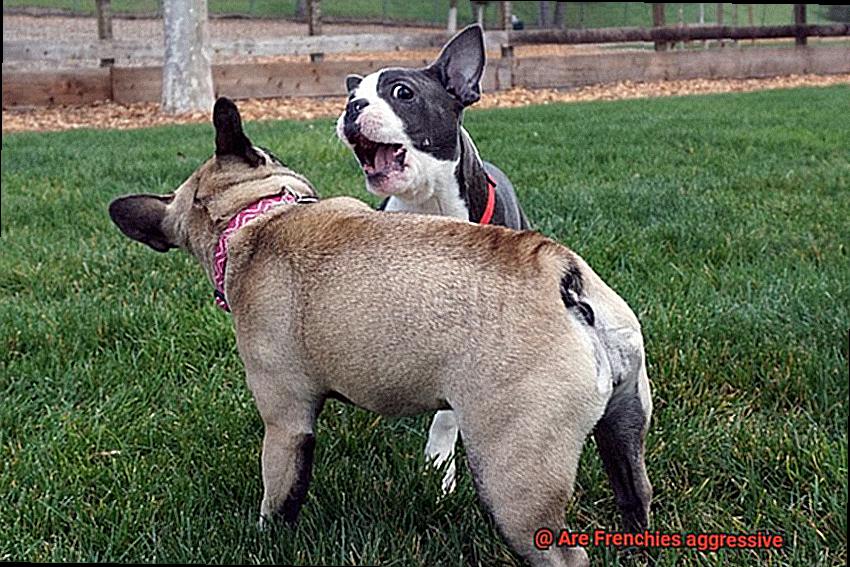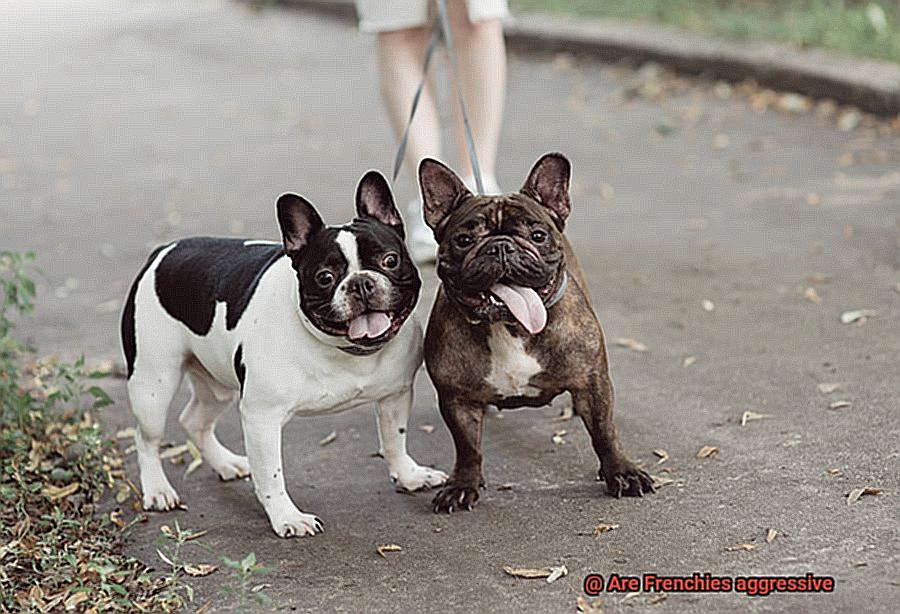Are Frenchies aggressive?
Get ready to uncover the truth about French Bulldogs, those irresistible little balls of fur that have stolen the hearts of dog lovers worldwide. With their squished faces and playful personalities, it’s hard not to fall head over heels for these adorable canines. But amidst all the Frenchie frenzy, there’s one burning question that often lingers – are they aggressive?
In this blog post, we’re going on a wild ride through the world of French Bulldog temperament, separating fact from fiction and debunking the myth of Frenchie aggression once and for all. So grab a cup of your favorite brew and join us as we dive into the fascinating realm of these lovable pooches.
Prepare to have your preconceptions shattered as we unveil surprising insights that challenge common misconceptions about Frenchies. We’ll explore their unique characteristics, unravel the factors that may contribute to their occasionally misunderstood behavior, and ultimately reveal the true nature of these captivating creatures.
So let’s put our detective hats on and embark on this adventure together. Get ready to discover why French Bulldogs are anything but aggressive.
Are Frenchies aggressive
Contents
- 1 Are Frenchies aggressive
- 2 Are French Bulldogs Naturally Aggressive?
- 3 How to Prevent Aggression in Frenchies
- 4 Socializing your Frenchie for Non-Aggressive Behavior
- 5 Training Techniques to Avoid Aggression in French Bulldogs
- 6 Signs of Potential Aggression in Frenchies
- 7 When to Seek Professional Help for an Aggressive Frenchie
- 8 Providing Stimulation and Exercise for Your Frenchie
- 9 Regular Veterinary Check-Ups for Your Frenchie
- 10 Conclusion
Debunking the Myth
French Bulldogs, or Frenchies as they are affectionately called, are known for their friendly and affectionate nature. They are great companion animals and typically get along well with people, including children, and other pets.
However, like any breed, individual Frenchies can display aggressive behavior under certain circumstances. In this article, we will explore the causes of aggression in French Bulldogs and provide tips on how owners can prevent or address it.
Causes of Aggression in French Bulldogs
Aggression in French Bulldogs can be triggered by various factors. It is important to note that aggression is often a response to a specific situation or stimulus and not an inherent trait of the breed. Here are some common causes of aggression in Frenchies:
- Lack of Socialization: Proper socialization from an early age plays a significant role in preventing aggression in French Bulldogs. Exposing them to different people, animals, and environments helps them become well-rounded and comfortable in various situations.
- Fear: Like any dog, Frenchies can become aggressive when they feel threatened or fearful. It is crucial for owners to understand their dog’s body language and behavior to prevent any potential aggression.
- Territorial Instincts: Some French Bulldogs may display aggression when they feel their territory is being invaded or when protecting their family. Proper training and supervision can help address territorial aggression.
- Health Issues: Health problems can sometimes contribute to aggression in French Bulldogs. Pain or discomfort caused by underlying medical conditions can lead to defensive or aggressive behavior. Regular veterinary check-ups and addressing any health concerns promptly can help mitigate these issues.
Preventing and Addressing Aggression
Preventing aggression in French Bulldogs starts with proper socialization and training:
- Socialize your Frenchie from a young age by exposing them to different people, animals, and environments.
- Use positive reinforcement techniques, such as rewards and praise, to train your Frenchie. Consistent and gentle training methods can help them learn appropriate behavior and respond positively to commands.
- Provide mental stimulation and physical exercise to prevent behavioral problems that may lead to aggression.
- Regular veterinary check-ups are important to rule out any underlying health issues that could contribute to aggressive behavior.

When to Seek Professional Help
If your Frenchie displays signs of aggression, such as growling, snapping, lunging, or biting, it is important to seek professional help from a qualified dog trainer or behaviorist. They can assess the situation and provide you with effective strategies to address the aggression.
Are French Bulldogs Naturally Aggressive?
Let’s dive into the factors that influence their temperament and behavior.
- Genetics: Like humans, dogs inherit certain traits from their parents. Reputable breeders prioritize breeding dogs with good temperaments to ensure that aggression is not passed on to future generations. So, choosing a responsible breeder who prioritizes temperament is crucial when getting a French Bulldog.
- Environment and Socialization: Just like humans, dogs are shaped by their environment. French Bulldogs raised in loving and nurturing households, with proper socialization from an early age, are more likely to be well-behaved and non-aggressive. On the flip side, dogs that are neglected or mistreated may develop fear or aggression issues. So, make sure to provide a positive and enriching environment for your Frenchie.
- Individual Temperament: Each dog has its own unique personality traits, and French Bulldogs are no exception. While some Frenchies may be naturally calm and friendly, others may have a more assertive or dominant personality. Understanding your dog’s temperament is key in preventing aggression issues and providing appropriate training and guidance.
- Causes of Aggression: It’s important to note that aggression in any breed is not always innate but can be triggered by various factors such as fear, anxiety, territoriality, or lack of socialization. Identifying the underlying cause of aggression is crucial in addressing and managing the behavior effectively.
- Professional Help: If your French Bulldog displays aggressive behavior, don’t hesitate to seek professional help from a certified dog trainer or behaviorist who specializes in aggression cases. They can assess your dog’s behavior, identify the root causes, and provide guidance on positive reinforcement techniques to manage and correct the aggression.
How to Prevent Aggression in Frenchies
French Bulldogs are known for their friendly and sociable nature, but just like any other breed, they can exhibit aggressive behavior under certain circumstances. As responsible pet owners, it is our duty to prevent aggression in our Frenchies by providing them with the right training, socialization, and care. In this article, we will explore effective strategies to help you prevent aggression in your Frenchie, ensuring a harmonious and happy relationship.
Start Early: Socialization is Key.
Socialization plays a crucial role in preventing aggression in French Bulldogs. From a young age, expose your Frenchie to different people, animals, and environments. Take them on walks, visit dog parks, or invite friends over to interact with your pup. Positive experiences during early socialization will shape your Frenchie’s behavior and help them become confident and friendly.
Positive Reinforcement: Train with Love and Treats.
Positive reinforcement training is an excellent way to prevent aggression in French Bulldogs. Use treats, praise, and play as rewards when your Frenchie displays good behavior. This approach encourages your pup to repeat positive actions and reinforces good manners. Avoid punishing your Frenchie as it can instill fear or even trigger aggression.
Consistency is Key: Establish Clear Rules and Boundaries
Dogs thrive when they know what is expected of them. Establish clear rules and boundaries for your Frenchie and consistently enforce them. This helps prevent confusion or frustration that can lead to aggressive responses. Be firm but fair in your leadership, providing a structured environment that your Frenchie can rely on.
Exercise Body and Mind: A Tired Dog is a Happy Dog.
Regular exercise and mental stimulation are essential for preventing aggression in French Bulldogs. Engage in activities such as daily walks, interactive toys, puzzle games, or obedience training sessions. These activities keep your Frenchie’s mind and body active, reducing boredom and frustration that may lead to aggressive behavior.
Early Detection and Intervention: Addressing Aggression Promptly
Keep a close eye on your Frenchie’s behavior and promptly address any signs of aggression or potential triggers. If you notice concerning behavior, seek professional help from a certified dog trainer or behaviorist experienced in aggression issues. Early intervention can make a significant difference in preventing the escalation of aggressive behaviors.
Socializing your Frenchie for Non-Aggressive Behavior
Socializing your French Bulldog is a crucial step in raising a well-behaved and friendly companion. In this comprehensive guide, we will explore effective techniques and strategies to socialize your Frenchie for non-aggressive behavior. By following these tips, you can ensure that your furry friend grows up to be confident, adaptable, and a joy to be around.
Start Early and Gradually Increase Exposures:
- Introduce your Frenchie to various people, animals, and environments from a young age.
- Begin with familiar faces and gradually increase the number of individuals they interact with.
- Encourage gentle interactions and positive experiences, rewarding calm and friendly behavior.
Interact with Different Dog Breeds and Sizes:
- Arrange playdates with other friendly dogs, ensuring close supervision.
- Visit dog parks or enroll in obedience classes that provide opportunities for socialization.
- Address signs of aggression immediately and redirect their attention towards positive interactions.
Expose Your Frenchie to Different Environments:

- Take your Frenchie on walks in busy streets, visit parks, or dog-friendly cafes.
- Gradually increase the level of stimulation as they become more comfortable.
- This exposure helps them develop confidence and adaptability.

Use Positive Reinforcement:
- Reward your Frenchie with treats, praise, or playtime when they display friendly behavior.
- Create positive associations by reinforcing their good behavior consistently.
- Avoid punishment or force as it may lead to fear or aggression.
Be Consistent and Patient:
- Understand that socialization takes time and effort.
- Be patient with your Frenchie as they adjust to new experiences and individuals.
- Gradually increase the duration and intensity of socialization sessions.
Training Techniques to Avoid Aggression in French Bulldogs
We all know that Frenchies are adorable little bundles of joy, but like any dog breed, they can sometimes exhibit aggressive behavior if not properly trained and socialized. So, how can you avoid aggression in your furry friend? Let’s dive into some training techniques that can help.
- Establish yourself as the pack leader: Dogs are pack animals by nature, so it’s important to establish yourself as the leader. This doesn’t mean you have to be a dictator, but rather someone your Frenchie looks up to for guidance and support.
- Positive reinforcement is key: When it comes to training your Frenchie, positive reinforcement is the way to go. Reward good behavior with treats, praise, or playtime. This will encourage your Frenchie to repeat desirable behaviors and discourage any aggressive tendencies.
- Socialization is crucial: Expose your Frenchie to different people, animals, and environments from an early age. This will help them feel comfortable and confident in various situations, reducing the likelihood of aggression towards unfamiliar faces.
- Be consistent: Consistency is key when it comes to training any dog breed. Establish clear rules and boundaries, and ensure that everyone in the family follows them. Inconsistency can confuse your Frenchie and lead to behavioral problems, including aggression.
- Obedience training is a must: Teaching basic commands like sit, stay, and leave it can provide a solid foundation for good behavior. Plus, it helps establish clear communication between you and your Frenchie.
- Say no to punishment: Punishment-based training methods can trigger fear or aggression in dogs. Instead, focus on positive reinforcement techniques that reward good behavior.
- Seek professional help if needed: If your Frenchie is showing signs of aggression despite your best efforts, don’t hesitate to seek help from a professional dog trainer or behaviorist. They can assess the situation and provide tailored training techniques.
- Keep them active: Regular exercise and mental stimulation are essential for preventing aggression in French Bulldogs. A tired Frenchie is a well-behaved Frenchie, so make sure to engage in daily physical activities and provide mental stimulation through puzzle toys or training exercises.


Remember, safety first. If you ever feel overwhelmed or concerned about your Frenchie’s behavior, take necessary precautions to ensure the safety of yourself, your dog, and others. This may include using a muzzle during certain situations or seeking professional guidance.
Signs of Potential Aggression in Frenchies
Signs of Potential Aggression in Frenchies
French Bulldogs, or Frenchies as they are affectionately called, are known for their friendly and sociable nature. However, like any other breed, they can display signs of aggression under certain circumstances. It is important to note that aggression in Frenchies is not a common trait and is not inherent to their breed. In most cases, aggression in French Bulldogs is a result of various environmental factors, lack of socialization, or improper training. As an expert on this topic, I will provide you with valuable insights into the signs of potential aggression in Frenchies and how to address them.
- Growling or Snarling: One of the key signs of potential aggression in Frenchies is growling or snarling. When a Frenchie starts growling, it is usually a clear indication that they are feeling threatened or uncomfortable in a particular situation. This could be due to fear, territoriality, or even pain. If your Frenchie starts growling, it’s important not to dismiss it but rather assess the situation and determine the cause of their discomfort.
- Snapping or Biting: Another sign to watch out for is snapping or biting. If a Frenchie resorts to snapping or biting as a means of communication or defense, it should not be taken lightly. This behavior can escalate if not addressed promptly and appropriately. It’s crucial to understand the triggers for this behavior and work on modifying their response through positive reinforcement techniques.
- Body Language: Pay attention to your Frenchie’s body language as it can provide valuable insights into their potential aggression. Raised fur, raised hackles, stiff posture, and a tense facial expression are all indications that a Frenchie may be feeling aggressive or defensive. Recognizing these signs early on can help prevent any escalated aggressive behavior.
- Resource Guarding: Resource guarding is another common trigger for aggression in French Bulldogs. This occurs when a Frenchie becomes possessive over food, toys, or any other valuable item. They may display aggressive behavior such as growling, snarling, or even biting to protect their resources. It’s important to establish clear boundaries and teach them that resource sharing is a positive experience through gradual desensitization exercises.
- Lack of Socialization: Lack of socialization can contribute to potential aggression in Frenchies. Dogs that have not been properly exposed to different environments, people, and other animals may exhibit fear-based aggression when faced with unfamiliar situations. It is crucial to expose your Frenchie to various socialization experiences from an early age to help them feel more confident and comfortable in different settings.
Addressing Potential Aggression:
To address potential aggression in French Bulldogs, it is recommended to seek professional guidance from a dog trainer or behaviorist who specializes in positive reinforcement training methods. These experts can help you understand the underlying causes of your Frenchie’s aggression and implement effective training techniques tailored to your dog’s specific needs.
When to Seek Professional Help for an Aggressive Frenchie
French Bulldogs, or Frenchies, are known for their friendly and sociable nature. However, like any breed, they can display aggression under certain circumstances. Recognizing the signs of aggression and knowing when to seek professional help is essential for the well-being and safety of both your Frenchie and those around them. In this article, we will discuss when it is important to seek professional help for an aggressive Frenchie.

Signs of Aggression:
- Growling, snapping, lunging, biting, or showing teeth: These behaviors can be directed towards humans or other animals.
- Increased frequency or intensity of aggression: If your Frenchie’s aggression is becoming more frequent or intense, professional help is needed.
- Harm or injury caused by aggression: If your Frenchie’s aggression is causing physical harm to yourself, family members, or other pets, immediate intervention is necessary.
- Lack of improvement from training methods: If you have tried various training methods but have not seen any improvement in your Frenchie’s aggressive behavior, seeking professional help is crucial.
Feeling overwhelmed or unsure about handling the aggression: If you feel overwhelmed by your Frenchie’s aggression or are unsure about how to handle it, professional guidance can provide you with the knowledge and tools necessary.
Seeking Professional Help:
- Look for certified dog trainers or behaviorists: Choose professionals who specialize in working with Frenchies or aggressive dogs specifically.
- Customized behavior modification plan: A professional can assess the situation and develop a customized plan to address your Frenchie’s aggression effectively.
- Proactive approach: It is better to seek professional help sooner rather than later to prevent further escalation of aggressive behavior.
- Ensure the well-being and safety of everyone involved: Seeking professional help is a responsible step towards creating a safer and happier environment for your Frenchie and those around them.
Providing Stimulation and Exercise for Your Frenchie
French Bulldogs, or Frenchies, are energetic and playful dogs that require regular exercise and mental stimulation to keep them happy and healthy. In this section, we will explore different ways to provide physical and mental stimulation for your Frenchie.
- Daily Walks: Just like any other breed, Frenchies need regular exercise to maintain a healthy weight and prevent obesity. Aim for at least 30 minutes to an hour of brisk walking every day. However, it’s important to keep an eye on their energy levels during walks, as they are not known for their endurance. Adjust the duration and intensity of the walk according to your Frenchie’s energy levels.
- Interactive Play Sessions: In addition to walks, engage your Frenchie in interactive play sessions. Games like fetch or tug-of-war not only provide physical exercise but also stimulate their mind. These activities help keep them entertained and prevent boredom.
- Puzzle Toys and Treat-Dispensing Toys: To keep your Frenchie mentally stimulated, consider using puzzle toys and treat-dispensing toys. These toys require them to problem-solve and work for their rewards, keeping their minds engaged and active.
- Obedience Training and Agility Classes: Enrolling your Frenchie in obedience training or agility classes is an excellent way to provide mental stimulation. These activities not only challenge their minds but also strengthen the bond between you and your furry friend.
- Exercise Caution in Hot Weather: It’s important to note that Frenchies are brachycephalic dogs, which means they have a shortened muzzle that can make them more susceptible to heatstroke. When exercising them in hot weather, opt for early morning or late evening walks when temperatures are cooler. Always carry water for both you and your Frenchie to stay hydrated.
- Socialization Opportunities: Frenchies are social creatures and enjoy interacting with other dogs and people. Provide them with plenty of socialization opportunities, such as taking them to dog parks or arranging playdates with other friendly dogs. This will fulfill their social needs and keep them happy.
Regular Veterinary Check-Ups for Your Frenchie
Regular Veterinary Check-Ups for Your Frenchie
French Bulldogs are adorable and lovable companions, but they also require regular veterinary check-ups to ensure their overall health and well-being. As a proud Frenchie owner myself, I understand the importance of these check-ups in managing their unique health needs. Let’s dive into why regular veterinary check-ups are essential for your furry friend.
Monitoring and Managing Health Issues:
French Bulldogs are prone to certain health issues, including breathing problems, skin allergies, and joint disorders. Regular check-ups allow the veterinarian to monitor these conditions and provide appropriate management strategies. By staying proactive, you can ensure your Frenchie lives a happy and comfortable life.
Comprehensive Examinations:
During a routine check-up, the vet will conduct a thorough examination of your Frenchie. This includes checking their weight, temperature, heart rate, and respiratory functions. They will also inspect the eyes, ears, and teeth to ensure everything is in good condition. These examinations help detect any potential issues early on.
Vaccinations:
Vaccinations are a crucial part of your Frenchie’s healthcare routine. The vet will administer necessary vaccinations to protect your dog against common diseases. By keeping up with vaccinations, you help safeguard your Frenchie’s immune system and prevent potentially serious illnesses.
Early Detection of Health Issues:
Regular check-ups allow the vet to detect any underlying health issues early on. This is particularly important for French Bulldogs as they may not always show obvious signs of illness. Early detection can lead to prompt treatment and better outcomes for your furry friend.
Tailored Tests and Screenings:
Based on your Frenchie’s age, breed, and overall health condition, the vet may recommend specific tests or screenings. These tests can help identify any potential health concerns that may not be apparent during a physical examination. By understanding your Frenchie’s specific needs, you can address health issues proactively.
Behavior and Lifestyle Advice:
Regular check-ups provide an opportunity to discuss any concerns or behavioral changes you have noticed in your Frenchie. Your vet can provide valuable guidance and advice on how to address these issues. They can also help tailor your Frenchie’s lifestyle and recommend preventive care measures, such as flea and tick prevention, dental hygiene, and nutrition.
Building a Relationship with Your Veterinarian:
Building a good relationship with your veterinarian is crucial for the well-being of your Frenchie. They have an in-depth understanding of your dog’s medical history and can provide personalized advice and guidance. Regular check-ups allow you to develop trust and open communication with your vet.
U9FfZtV10_Y” >
Conclusion
French Bulldogs, often affectionately known as Frenchies, are often misunderstood when it comes to their temperament. While some may assume that these adorable pups have a tendency towards aggression, the truth is quite the opposite. Frenchies are generally known for their friendly and sociable nature.
Contrary to popular belief, French Bulldogs are not inherently aggressive dogs. In fact, they are known for their loving and gentle demeanor. They thrive on human companionship and enjoy being a part of the family. Their easygoing nature makes them great companions for individuals of all ages, from children to seniors.
One of the reasons why Frenchies have gained a reputation for being aggressive is due to their protective instincts. Like any other dog breed, they will defend their loved ones if they perceive a threat. However, this should not be mistaken as aggression but rather as loyalty and a desire to keep their family safe.
It’s important to note that aggression in dogs can often be attributed to poor breeding practices or inadequate training and socialization. Responsible breeders prioritize temperament when selecting breeding pairs, ensuring that offspring inherit desirable traits such as friendliness and sociability.
While individual personalities may vary among French Bulldogs, proper socialization from an early age plays a crucial role in shaping their behavior. Exposing them to different environments, people, and animals helps them develop into well-rounded and confident dogs.
In conclusion, French Bulldogs are not inherently aggressive dogs. With their friendly and sociable nature, they make wonderful companions for families of all types. Understanding their protective instincts and providing them with proper training and socialization will help ensure that they remain the loving pets they are known to be.




